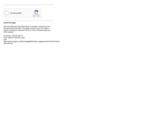
powerpoint for second unit in cinema scenes film history book chapters 8 through 13
- Subject:
- Arts and Humanities
- Material Type:
- Lecture Notes
- Author:
- daniels
- lenig
- mccready
- sherrill
- broadbent
- Date Added:
- 07/16/2022

powerpoint for second unit in cinema scenes film history book chapters 8 through 13

This training course is an introduction to the use of the AFNI software suites for the analysis of functional MRI (fMRI) data. It is not intended as an introduction to how fMRI works but is aimed at people who are already doing fMRI data analysis, or those who will be in the near future.
AFNI (Analysis of Functional NeuroImages) is a leading software suite of C, Python, and R programs and shell scripts, primarily developed for the analysis and display of anatomical and fMRI data. It is freely available for research purposes.
This event was organized by the Center for Brains, Minds, and Machines (CBMM) Trainee Leadership Council.
CBMM is a multi-institutional NSF Science and Technology Center headquartered at MIT that is dedicated to developing a computationally based understanding of human intelligence and establishing an engineering practice based on that understanding. CBMM brings together computer scientists, cognitive scientists, and neuroscientists to create a new field—the science and engineering of intelligence.
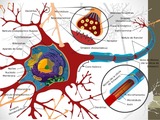
Anatomy and Physiology Lab I slide decks created by Steven Lee M.S. Pathology, FTCC. The PowerPoints include labeled body images to assist students in identifying body parts. Nicole Shaw is only responsible for assisting Steven with licensing his work under an open license and uploading content to the Commons.
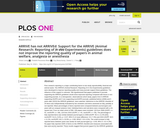
Poor research reporting is a major contributing factor to low study reproducibility, financial and animal waste. The ARRIVE (Animal Research: Reporting of In Vivo Experiments) guidelines were developed to improve reporting quality and many journals support these guidelines. The influence of this support is unknown. We hypothesized that papers published in journals supporting the ARRIVE guidelines would show improved reporting compared with those in non-supporting journals. In a retrospective, observational cohort study, papers from 5 ARRIVE supporting (SUPP) and 2 non-supporting (nonSUPP) journals, published before (2009) and 5 years after (2015) the ARRIVE guidelines, were selected. Adherence to the ARRIVE checklist of 20 items was independently evaluated by two reviewers and items assessed as fully, partially or not reported. Mean percentages of items reported were compared between journal types and years with an unequal variance t-test. Individual items and sub-items were compared with a chi-square test. From an initial cohort of 956, 236 papers were included: 120 from 2009 (SUPP; n = 52, nonSUPP; n = 68), 116 from 2015 (SUPP; n = 61, nonSUPP; n = 55). The percentage of fully reported items was similar between journal types in 2009 (SUPP: 55.3 ± 11.5% [SD]; nonSUPP: 51.8 ± 9.0%; p = 0.07, 95% CI of mean difference -0.3–7.3%) and 2015 (SUPP: 60.5 ± 11.2%; nonSUPP; 60.2 ± 10.0%; p = 0.89, 95%CI -3.6–4.2%). The small increase in fully reported items between years was similar for both journal types (p = 0.09, 95% CI -0.5–4.3%). No paper fully reported 100% of items on the ARRIVE checklist and measures associated with bias were poorly reported. These results suggest that journal support for the ARRIVE guidelines has not resulted in a meaningful improvement in reporting quality, contributing to ongoing waste in animal research.

Students will acquire new grade-level academic vocabulary by using images to make visual associations, which activiates student's long term memory. This lesson includes all of the information and materials that students need to create a vocabulary poster, share their poster with the class, practice a set of 14 vocabulary words, and take an assessment.

Mayer, Warner, Siedel and Lieberman's Advanced Business Law and the Legal Environment is an up-to-date textbook with coverage of legal and regulatory issues that are more technical than the topics in the authors' Foundations of Business Law and the Legal Environment.

This course is a continuation of 24.951. This semester the course topics of interest include movement, phrase structure, and the architecture of the grammar.

This course provides a deep understanding of engineering systems at a level intended for research on complex engineering systems. It provides a review and extension of what is known about system architecture and complexity from a theoretical point of view while examining the origins of and recent developments in the field. The class considers how and where the theory has been applied, and uses key analytical methods proposed. Students examine the level of observational (qualitative and quantitative) understanding necessary for successful use of the theoretical framework for a specific engineering system. Case studies apply the theory and principles to engineering systems.
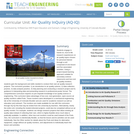
Students engage in hands-on, true-to-life research experiences on air quality topics chosen for personal interest through a unit composed of one lesson and five associated activities. Using a project-based learning approach suitable for secondary science classrooms and low-cost air quality monitors, students gain the background and skills needed to conduct their own air quality research projects. The curriculum provides: 1) an introduction to air quality science, 2) data collection practice, 3) data analysis practice, 4) help planning and conducting a research project and 5) guidance in interpreting data and presenting research in professional poster format. The comprehensive curriculum requires no pre-requisite knowledge of air quality science or engineering. This curriculum takes advantage of low-cost, next-generation, open-source air quality monitors called Pods. These monitors were developed in a mechanical engineering lab at the University of Colorado Boulder and are used for academic research as well as education and outreach. The monitors are made available for use with this curriculum through AQ-IQ Kits that may be rented from the university by teachers. Alternatively, nearly the entire unit, including the student-directed projects, could also be completed without an air quality monitor. For example, students can design research projects that utilize existing air quality data instead of collecting their own, which is highly feasible since much data is publically available. In addition, other low-cost monitors could be used instead of the Pods. Also, the curriculum is intentionally flexible, so that the lesson and its activities can be used individually. See the Other section for details about the Pods and ideas for alternative equipment, usage without air quality monitors, and adjustments to individually teach the lesson and activities.
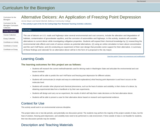
Road deicers raise several environmental and cost concerns. In this activity students consider alternatives while investigating colligative properties.
(Note: this resource was added to OER Commons as part of a batch upload of over 2,200 records. If you notice an issue with the quality of the metadata, please let us know by using the 'report' button and we will flag it for consideration.)
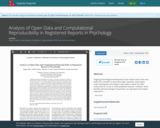
Ongoing technological developments have made it easier than ever before for scientists to share their data, materials, and analysis code. Sharing data and analysis code makes it easier for other researchers to re-use or check published research. These benefits will only emerge if researchers can reproduce the analysis reported in published articles, and if data is annotated well enough so that it is clear what all variables mean. Because most researchers have not been trained in computational reproducibility, it is important to evaluate current practices to identify practices that can be improved. We examined data and code sharing, as well as computational reproducibility of the main results, without contacting the original authors, for Registered Reports published in the psychological literature between 2014 and 2018. Of the 62 articles that met our inclusion criteria, data was available for 40 articles, and analysis scripts for 37 articles. For the 35 articles that shared both data and code and performed analyses in SPSS, R, Python, MATLAB, or JASP, we could run the scripts for 31 articles, and reproduce the main results for 20 articles. Although the articles that shared both data and code (35 out of 62, or 56%) and articles that could be computationally reproduced (20 out of 35, or 57%) was relatively high compared to other studies, there is clear room for improvement. We provide practical recommendations based on our observations, and link to examples of good research practices in the papers we reproduced.
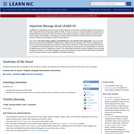
A lesson plan for Grade 7 English Language Development and Science. Students develop their knowledge of the circulatory system by studying the structure and function of the heart and its vessels.

This is a collection of mini lectures created by anthropologists and those in conversation with anthropology as supplimental material to assist college and university instructors who were made to shift their courses online because of COVID19.For more information, see here.To contribute, please create an OER author account and send your name and OER registered email to AnthropologyTeaching@gmail.com.

The fact of scarcity forces individuals, firms, and societies to choose among alternative uses – or allocations – of its limited resources. Accordingly, the first part of this summer course seeks to understand how economists model the choice process of individual consumers and firms, and how markets work to coordinate these choices. It also examines how well markets perform this function using the economist’s criterion of market efficiency.
Overall, this course focuses on microeconomics, with some topics from macroeconomics and international trade. It emphasizes the integration of theory, data, and judgment in the analysis of corporate decisions and public policy, and in the assessment of changing U.S. and international business environments.
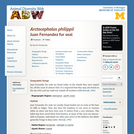
Arctocephalus philippii: Information
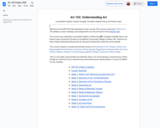
This is a ten-week course broken into thematic topics. Its current design is asynchronous online, though you will find a mix of asynchronous and synchronous activity options. It can be modified for any modality. Included are weekly activities, exercises, projects, and slides following the provided syllabus.
• ART102 Syllabus
• Week 1: What is Art? What do you want from art?
• Week 2: Elements of Art: Formal Elements
• Week 3: Elements of Art: Principles of Design
• Week 4: Describing Art
• Week 5: Media & Materials: Images
• Week 6: Media & Materials: Objects
• Week 7: Symbols & Iconography
• Week 8: Contexts of Art
• Week 9: Art and Artists
• Week 10: Public Art/Art & Controversy
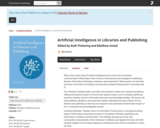
What is the current state of artificial intelligence (AI) in the world of scholarly communication? What impact does AI have on the practices and strategies of publishers, libraries, information technology companies, and researchers? What exactly is AI and what are those in the realm of scholarly communication actually thinking about it and doing with it?
This Charleston Briefing seeks to provide some answers to these very important questions, offering both general essays on AI and more specific essays on AI in scholarly publishing, academic libraries, and AI in information discovery and knowledge building. The essays will help publishers, librarians, and researchers better understand the actual impact of AI on libraries and publishing so that they can respond to the potentially transformative impact of AI in a measured and knowledgeable manner.
"Charleston Briefings: Trending Topics for Information Professionals" is a thought-provoking series of brief books concerning innovation in the sphere of libraries, publishing, and technology in scholarly communication. The briefings, growing out of the vital conversations characteristic of the Charleston Conference and Against the Grain, will offer valuable insights into the trends shaping our professional lives and the institutions in which we work.
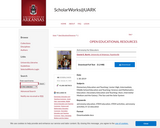
Astronomy for Educators provides new and accomplished K-12 instructors with concepts and projects for low-cost, high-impact STEM classroom instruction that is built around the National Academies National Research Council's K-12 Framework for Science Education.
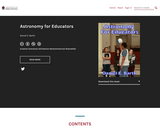
Long Description:
Astronomy for Educators provides new and accomplished K-12 instructors with concepts and projects for low-cost, high-impact STEM classroom instruction that is built around the National Academies National Research Council’s K-12 Framework for Science Education.
Word Count: 99103
(Note: This resource's metadata has been created automatically by reformatting and/or combining the information that the author initially provided as part of a bulk import process.)
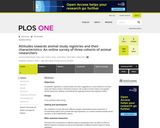
Objectives Prospective registration of animal studies has been suggested as a new measure to increase value and reduce waste in biomedical research. We sought to further explore and quantify animal researchers’ attitudes and preferences regarding animal study registries (ASRs). Design Cross-sectional online survey. Setting and participants We conducted a survey with three different samples representing animal researchers: i) corresponding authors from journals with high Eigenfactor, ii) a random Pubmed sample and iii) members of the CAMARADES network. Main outcome measures Perceived level of importance of different aspects of publication bias, the effect of ASRs on different aspects of research as well as the importance of different research types for being registered. Results The survey yielded responses from 413 animal researchers (response rate 7%). The respondents indicated, that some aspects of ASRs can increase administrative burden but could be outweighed by other aspects decreasing this burden. Animal researchers found it more important to register studies that involved animal species with higher levels of cognitive capabilities. The time frame for making registry entries publicly available revealed a strong heterogeneity among respondents, with the largest proportion voting for “access only after consent by the principal investigator” and the second largest proportion voting for “access immediately after registration”. Conclusions The fact that the more senior and experienced animal researchers participating in this survey clearly indicated the practical importance of publication bias and the importance of ASRs underscores the problem awareness across animal researchers and the willingness to actively engage in study registration if effective safeguards for the potential weaknesses of ASRs are put into place. To overcome the first-mover dilemma international consensus statements on how to deal with prospective registration of animal studies might be necessary for all relevant stakeholder groups including animal researchers, academic institutions, private companies, funders, regulatory agencies, and journals.